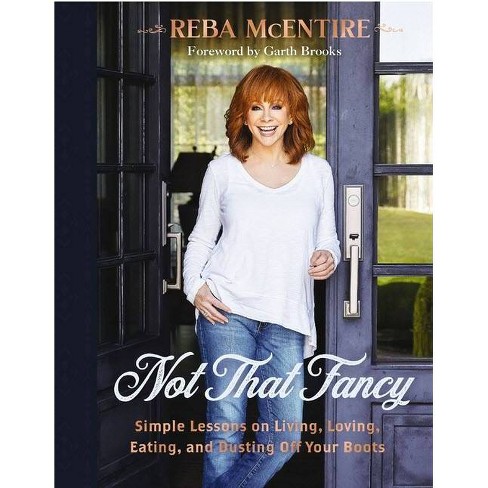Country Music & Faith: The Stage, the Songs, and the Soul
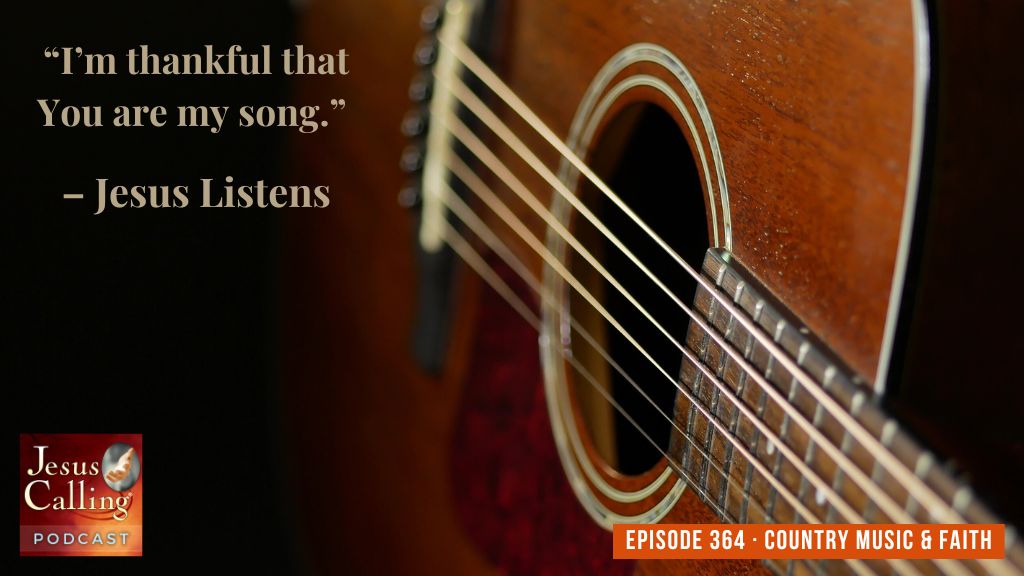
Narrator: Welcome to the Jesus Calling Podcast. This week, in celebration of CMA Fest 2023—a country music festival that takes place in Nashville, Tennessee—we’ve got a special episode showcasing country music and faith. We’ll revisit some favorite episodes from country singers who share their stories of heartache, joy, struggles, and success—and how they trusted God through it all.
First up, we’ll hear from multi-platinum selling artist Brett Young.
Brett Young’s Story
Brett Young: Music has been nothing short of a very long journey for me. I was one of the few guys in my group of friends in Los Angeles that were pursuing music that was actually making money in music.
The problem was I was making money playing bars and restaurants, singing other people’s songs to a bunch of people that didn’t know I was there. And so after ten years of “success,” I hadn’t met a record executive. I hadn’t written an original song. I didn’t really feel like I was doing what I wanted to do in music. And I decided that it was time, at my age, to switch gears and write songs for other people because I wasn’t going to be given the platform that I needed in order for people to care about my songs.

I moved to Nashville, started writing songs for other people, and then somebody needed to sing the demo. And so I would sing on the demo and we would pitch the songs to other artists. And within a couple of months of living in Nashville, everybody wanted to know who the demo singer was. And I always say, “If you want to make God laugh, tell Him your plans.” That’s kind of how my situation worked out. I felt like I was a little too old to start a career. And I moved to Nashville and God said, “Here you go, here’s your career.” And from that moment on, I made writing songs important and I made being authentic in my songwriting important because I feel like that is the only way to connect with your fans. You don’t get time to go meet every single one of the thousand people that come out every night. So the only way you have to connect with them is to show them who you are through your songs. And so I’ve spent my career, from the moment I was given that platform, trying to make sure everything I said was true and a real life experience for me that I could connect with so that I didn’t have to feel like I wasn’t being genuine when I was asking them to connect every night. And I feel like it’s worked. And I feel like that’s the reason that I’ve been able to have a really close connection to all my fans.
“I always say, ‘If you want to make God laugh, tell Him your plans.’” – Brett Young
And so, you know, moving forward for me, I feel like that’s the brand and that’s something that I will always nurture and make sure that whatever you’re getting from me is always a very clear picture of where I’m at in my life and who I am as a person.
Narrator: Next, we’ll hear from rapper and country music collaborator Lathan Warlick.
Lathan Warlick’s Story
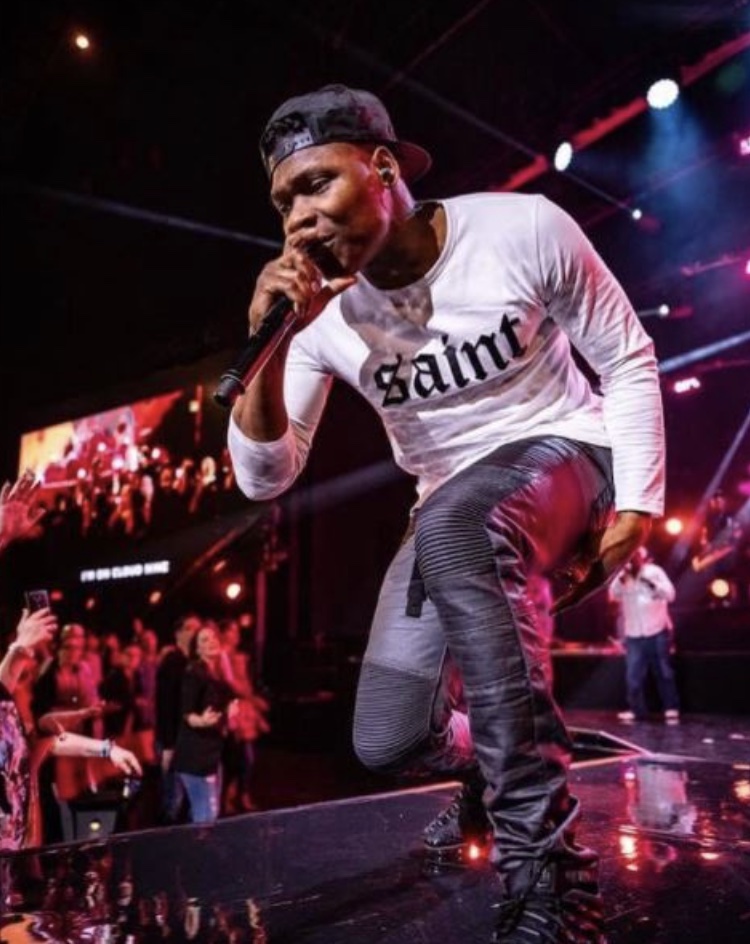
Lathan Warlick: My grandma, my momma were always saying something about Jesus or something about God or making us go to church, you know, but like I said, my environment caught me. So I wasn’t able to go to church, like, so much. I didn’t want to go to church. It was just, “Hey go.” So I was just going because they were telling me to go.
Something had to happen in order for me to say, “Look,” because I was a hard-headed guy, like I was so hard-headed.
I’m a dancer. I was a dancer before I started rapping, you know, so I remember doing a talent show in my hometown and we won the talent show. So when we won the talent show we were like, “Man, let’s go celebrate.” What other place is there to celebrate than going to the club, you know? So that’s what we were doing. We went to the club and started dancing. And I remember being in a circle and dancing with some of my guys. And then I noticed that one of the guys, like across the way, was looking at us.
My cousin beside me, he had problems with the guy and I didn’t even know it.
Now I’m left by myself. I’m just standing in this situation. And as these guys are walking towards me, I’m like, “Dude, this definitely is not good.” So I took off running, and when I took off running, I ran around the building of this club.
These two guys are chasing me. And so as I go around the back of this club, I’m looking back and as I’m looking back and running and looking back and running, I run right into a brick wall.
The dude comes around with a .45 caliber pistol and he’s just got it down to his side. The guy that he was standing beside was like, “Hey, man, go ahead and shoot him. Go ahead and kill him, kill him.” And he said, “Ain’t nobody around but us, bro, go ahead and kill him. Go and shoot this dude.” And reality didn’t hit me until he pointed the .45 at me, when he pointed the .45 in my face.
So I’m standing there and as I’m standing there, I can remember my grandmama always saying if I was ever in a time of need to just call on God, you know, that was like one of the one things that I can remember with my back against this wall.
“I can remember my grandma always saying if I was ever in a time of need to just call on God, that was like one of the things that I can remember with my back against this wall.” – Lathan Warlick
So I’m just sitting there like, Oh, man, I don’t want to die. Like, I don’t want to. I don’t want to. I don’t want my parents to see me like this on the news, their son being murdered outside of a club in the back. I don’t want my grandmama seeing this because she’s always trying to teach me and to talk to me about God, about Jesus.
And dude with my back against the wall, nowhere else to go. I’m standing there with this .45 caliber pistol pointed to my face. I remember looking up and I told God, I said, “If you’re really like everybody says you are, then just get me out of this situation.” It was that simple.
And so as this guy looks at me, he looks at his friend. He looked back at me and he said, “Okay.” His friend said, “Go on and shoot him.”
And he looked back at his friend. He said, “You want me to shoot him?”
His friend’s like, “Shoot him, shoot him, what are you waiting on? Come on, before somebody comes, go on and shoot him.”
He looked at his friend, he looked back at me, and he put the trigger right in my face. He just pulled the trigger.
When he pulled the trigger, the gun clicked and after the gun clicked, I really looked at it like, Oh my God, this is it. Like, this is life. Is this what death is like? Is this the experience of me going to wherever I’m going?
But at the same time that he pulled the trigger, his friend told him again, he was like, “Man, you don’t know what you’re doing. You don’t know what you’re doing. Give me the gun. Give me the gun.” And he took the gun out of his hand.
When he took the gun out of his hand, he cocked it back and a bullet ejected out of the gun. So when he cocked it back again, he joined in on it. As soon as he drew down on me and he got right to me, a car hit the corner. And when a car hit the corner, the lights from the car, it sent him into a like, “Oh, let me put up [the gun]. Let me put it up,” you know? And so they put it up and they kind of walked off a little bit and then they took off running.
I’m walking away from the scene, walking away from the area, I just feel something heavy, you know what I’m saying? Like, it’s a feeling I had never felt in my life. You know, I’m saying it was like a heavy feeling. It was like something was sitting on my shoulders. It was like something was sitting on my shoulders. It was like something was holding me, you know, and the feeling was so powerful that it made me start weeping for no reason.
God was calling me to be a light out into the world. So if He called me to be a light out into the world, just like Luke 15 when He talks about how people in heaven are going to be rejoicing over this one person getting saved versus a thousand people that’s already saved. So if I put that in perspective, like, “Okay, if I do that God, if you want me to be in this area, put me everywhere,” like I talk to God like that. I don’t know how y’all talk to God, but I talk to God like, “If you don’t mind, can you put me here,” you know, so that’s why I say [I’m] a positive artist, because if you label me as a Christian artist or a country artist or a gospel rapper or hip hop artist, then you’re going to put me in a box.
“God was calling me to be a light out into the world.” – Lathan Warlick
It was like God put me out of my comfort zone to put me over here in order for something else to happen.
Narrator: Stay tuned to hear from Loretta Lynn’s granddaughter, Tayla, after a brief message.
Preorder Reba McEntire’s Not That Fancy
The best things in life are really not that fancy. Superstar Reba McEntire’s new lifestyle book Not That Fancy: Simple Lessons on Living, Loving, Eating, and Dusting Off Your Boots invites readers to get back to the basics of life: fun, food, friends, family and faith. Not That Fancy features never-before-told stories, delicious recipes, and some of the Oklahoma-style truths that guide her life. Plus, photographs from Reba’s childhood, her career and personal life. Order your copy wherever you buy books.
We’re back with a story from Loretta Lynn’s granddaughter, singer Tayla Lynn.
Tayla Lynn’s Story
Tayla Lynn: When I was little, my relationship with God started off in a really sweet way. You know, I had an aunt, she was Church of Christ, and we would go to Sunday school and church with her all the time. And, of course, being a wild child, I never liked to sit down in church or concentrate on anything. So she would read us little Bible stories and tell us that God was love, you know, Jesus is love. That’s all you need to know. Jesus is love. He’s always here for you. And so as a child, I loved Jesus. I mean, I just thought that was the most incredible thing in the world that we had this thing that loved us unconditionally.
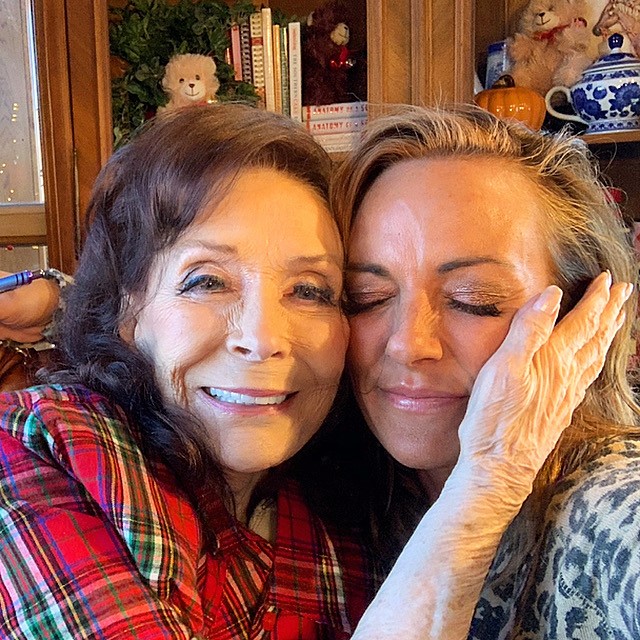
I lived with my mom out in Franklin, Tennessee, with her side of the family, and then my dad was on the road with my grandmother, Loretta Lynn, just all the time. And so it went between really wanting to be with my dad and being resentful at him because I never got to see him. But then also being super grateful, because to see him, I got to go out on the road with my grandmother, which was a dream.
Meemaw has always been very present in my life, we’ve had this connection since I was little.
I feel like I lived like five different lives as a child. I was spoiled by my mom and her mom and that family in Franklin. And then I also loved Meemaw and my dad and the road, but I couldn’t get enough of them. So I would just watch Coal Miner’s Daughter every day.
And so when I was very little, because I heard it all the time, I mean, like three or four years old, I sang all of Coal Miner’s Daughter standing in a corner with my nose pressed into the corner to Meemaw. And Meemaw was like, “Well, Cindy, I think that she actually can sing.” And so from that point, Meemaw started going, “You’re a singer, you’ve got this.”
Like lots of little girls who grow up watching a rags to riches story—and I’m at this point, living in a junkyard in a trailer in the sixth grade, watching this film going, I’ve got to get out of here. I’ve got to get out of here. And then I can be like her. She got out of there. She’s that. I can be that.
The first time I drank, I was an alcoholic. I was fourteen. As I got into my teenage years and there was abuse and terror at our house, at times it was literally me and God in a closet. Like it was just me and God. I mean, that was it. I knew nobody else would protect me, and I knew that He would somehow, and I would be okay with Him, hand-in-hand.
When I started using drugs, I would hide from Him. Like, I can literally picture myself still putting up a curtain from my heart, from my head, where God couldn’t see what I was doing.
So when I got away from Mom and moved in with Meemaw and realized at least the honky tonks in downtown Nashville were going to let me do whatever I wanted to because of Meemaw—maybe not anywhere else in the world, but definitely downtown Nashville. And I just got in the drug scene really, really fast down there. And it was days. I mean, I remember trying cocaine for the first time, pain pills were my main addiction, and just thinking every hole that I’ve had in my heart was filled immediately. And not only that, I mean, Meemaw didn’t really know what I was up to, but I was also on the road with her as a job.
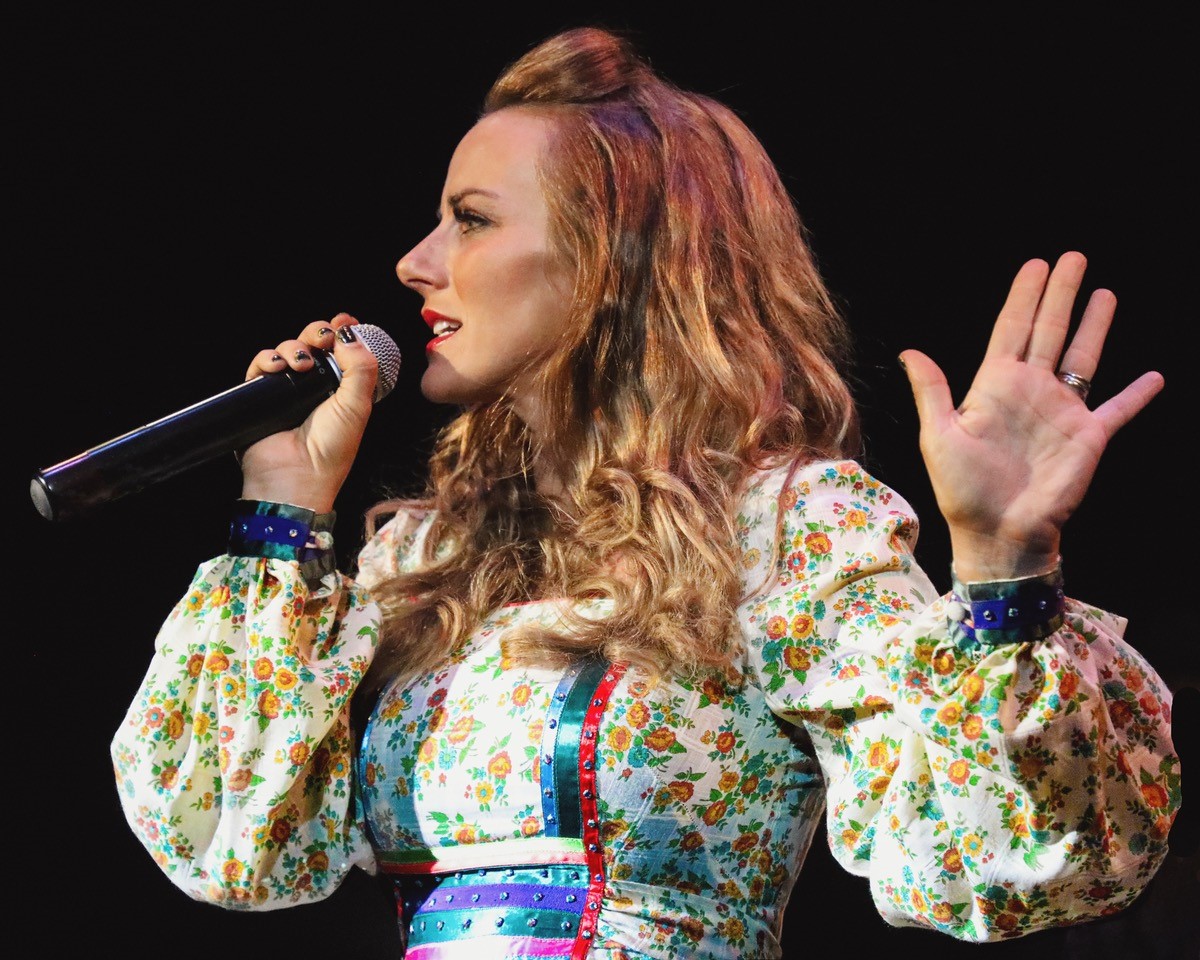
So fast forward twelve years or whatever later. And I’m sitting on a bus and sitting on her stage, signing autographs to her fans, and thinking, Okay, I survived that and now I’m here and things are good. But it wasn’t long until I couldn’t hold that anymore. I couldn’t go on the road. I couldn’t sign an autograph, I couldn’t go on stage. I mean, I was just too lost. The drugs became the most important thing. And she actually sent me to my first rehab out in Sierra Tucson when I was like close to twenty. You know, that was the first of eight. It took a lot of years for me to get to good.
When I got off of heroin and crack in 2004, I was so sick. I weighed eighty-two pounds, I’m five foot one, I was bruised all over, I was so sick. I mean, they picked me up from jail, just the whole shebang. I was so grateful to be in rehab and have food and by that time, I was going to die. I was trapped with some drug dealer. I mean, you know, just disgusting life. And so I had been hiding and running and I think at that point in 2004 I was just so grateful to be alive and I could start feeling that spiritual connection again.
When I got sober, you know, you find all these devotion books. You’re just always searching for some way to get closer to God. And I found Jesus Calling at Barnes and Noble. I think I was just at a bookstore and the book is so cute anyway, you know, it’s like a little book. And I opened the book and read one devotion. I was like, Oh my goodness. It just rang so true. And I bought it and I bought one for everyone—I was living at a halfway house and I bought one for every girl there, and we would wake up every morning and do the Jesus Calling devotional and just pray and speak on that. And through the years, I’ve bought them as gifts.
I have to get up every single morning and pray and get connected to God and read some sort of spiritual material and turn my will in my life over to God or I’m right back there. It is a disease and it lasts a lifetime.
I never felt abandoned. I never felt like God wasn’t there. I always knew any time that I wasn’t feeling God, it was because that was of my own doing. God is everything to me. Jesus is everything to me. You know, it’s always been that way.
“I never felt abandoned. I never felt like God wasn’t there. I always knew any time that I wasn’t feeling God, it was because that was of my own doing. God is everything to me. Jesus is everything to me. You know, it’s always been that way.” – Tayla Lynn
Narrator: Next up, singer/songwriter Granger Smith and his wife Amber.
Granger & Amber Smith’s Story
Granger Smith: Faith was a big part of my upbringing. In fact, my mom always says that she read the entire New Testament to me when I was nursing, and she loves to repeat that story. And you know, we were a church-going family and a lot of times begrudgingly put on the nice clothes, me and the brothers, you know, all dirty going to church and squirming around in the pew and dad squeezing our wrist and trying to tell us to stop making noises. It was always a big focus. So I got baptized when I was in confirmation class, twelve years old in the Methodist Church. And it was a big part of my upbringing and who we were, and my parents were just rocks in that aspect.
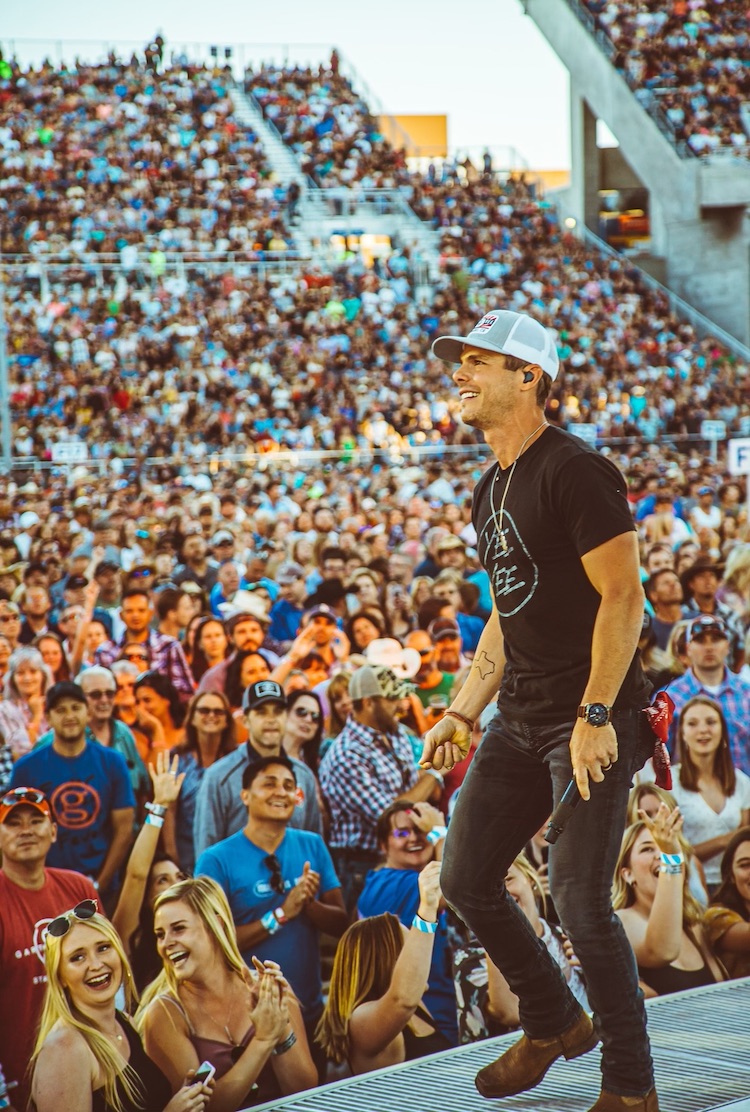
As I left, left the nest, left the family, you know, you go on and you start seeing the world and you start learning things and you start reading books that kind of contradict what you thought you knew that the scriptures told you. And then you meet worldly people and you meet people outside of the faith and and you think, There’s a whole new world out there. As I went to Nashville and started hanging around with all these musicians, I would drift. And it probably wasn’t until we started having kids and we got married that we realized that maybe we should reel this in a little bit and revisit God.
Amber Smith: And then as we started having babies, we started to read, you know, devotionals or read the Bible or pray together.
Granger: When you hold little humans, you know, and you realize that they depend on you for so much and you look into their eyes and you see the reflection of you and you see your genetics and you see their eyebrows that kind of look like yours and cheekbones that look like hers—it’s just such a miracle. God is undeniable in a baby. And the more and more you hold that baby and you realize the responsibility you have, then I would realize my responsibility now is to show them the foundation that I had when I was growing up.
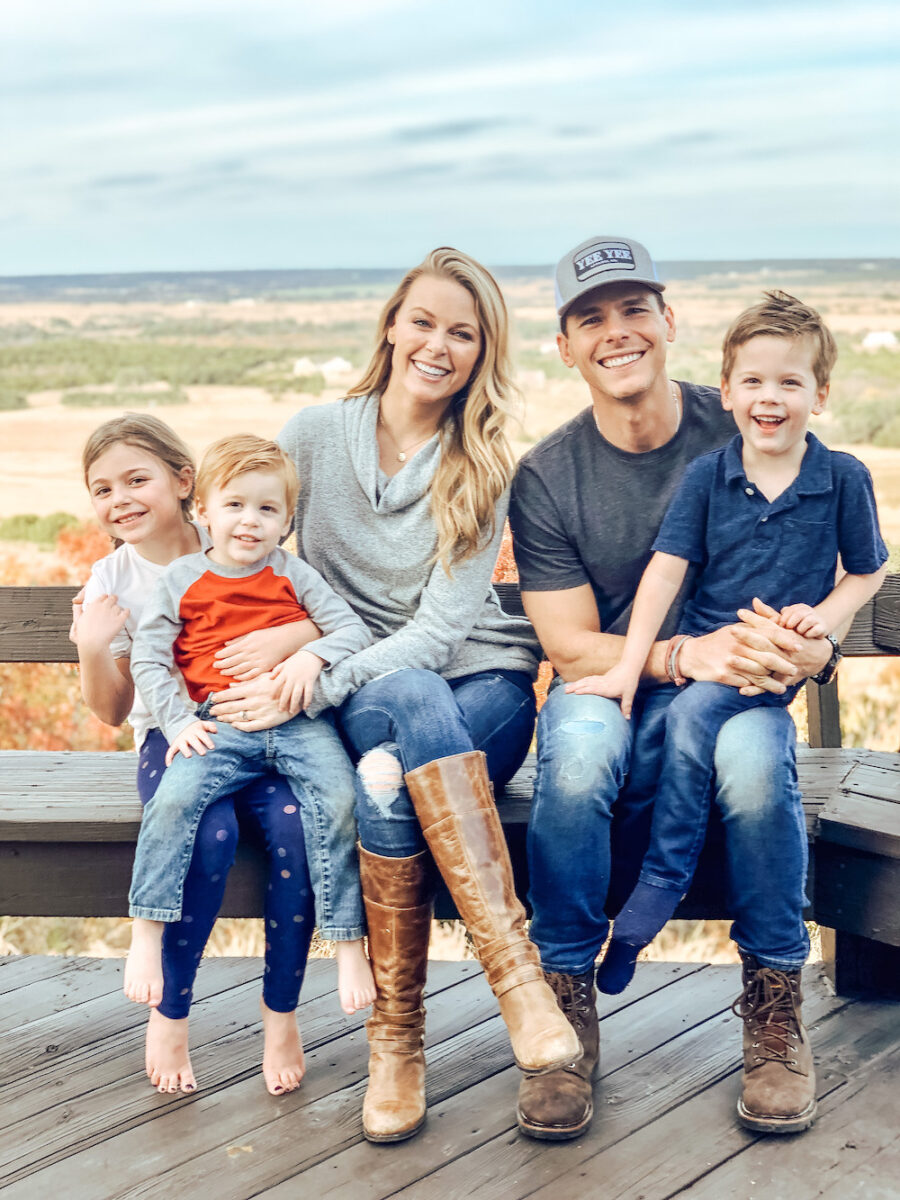
Amber: I feel like we were in a really good place. We were living in our “dream” home, if you can say that. Granger’s career was booming, you know, the kids were happy. We were really, really digging into our faith, reading in the mornings. You know, we were devoting time, we were praying together. I just feel like we were doing everything, it just felt right. We just felt like we were in the right space. And then that’s when tragedy happens, a lot of times for a lot of people.
I remember looking at River and I got him out of his high chair and I remember thinking, He needs to go to bed. It was such a beautiful day outside. We had the doors open. My daughter wanted to take Granger outside to tell him a secret, I think, out there, but the boys wanted to follow. It had been a stressful day for me, which he reminded me of. And I went to go take a shower, so I got River down, let them go outside. And at one point, Granger called me maybe just before I got in the shower and said, “Can you take the boys inside?” And I was like, “I need a minute, I need to just go take a shower.” And I didn’t. I didn’t do it. And then the next thing I remember was I had just gotten out of the shower and sat on the bed, and I heard my daughter scream and we had the doors open, and our room was a little bit back in the house. So all I could hear was “River” and “pool.” And so in my mind, I’m thinking He’s still in the water. I’m going to run out. I don’t know how he got out of the gate, but I’m going to run out. I’m going to grab him. He’s going to be fine. And I was running and I remember I think I yelled, “Where’s Daddy?” But as soon as those words came out of my mouth, I looked and I saw Granger and he was already doing CPR on River.
So we took turns doing CPR for about ten minutes before the ambulance got there. We were trying to get the kids away and the ambulance arrived. They got his heartbeat back. So we were excited. We were hopeful. We thought, My gosh, this is just a scare. He’s going to be fine. So we rushed into the car, went to the hospital, and then we spent the next three days there at the hospital.
He would make little movements, little twitches, you know, and I remember our doctor or nurse telling us any movement is good. So we were hopeful, you know, little movements, and we realized later those were the start of seizures that we didn’t know. We did a lot of praying. And I think it was twelve hours later, but the doctor came in and said, “I’m so sorry. There’s no brain activity at all. There’s zero chance of recovery.” And we just said, “We want a second opinion. We want a second opinion, a third opinion.” We asked for a second opinion and then a third, and we have three different neurology teams that were monitoring him for those two days. And every time they would come in and just say, “I’m so sorry, there’s zero chance.”
Granger: A lot of people were texting during this time. But I remember one specific text that sticks out to me. And he said, “Don’t unplug those machines. Don’t listen to these doctors. The Lord will heal this child. If you finally get all man’s hands out of it and let humans get out of there, it’ll give God His opportunity to perform this miracle and He will bring this child back. Don’t listen to anyone else. Just pray and trust.” And I just overwhelmingly felt that’s wrong. That’s not what the Holy Spirit is telling me right now.
Amber: Not that He can’t.
Granger: Not that He can’t. Not that He wouldn’t. But that wasn’t my story. It wasn’t River’s story. And the only way I could explain that is the peace that came over me. And I just said, “No, that’s not my prayer. My prayer is not to heal this child no matter what.” I wanted it to be, desperately. But that’s not what came out of my mouth. My prayer was, “God, help me make the right decision in this moment right now for my family. Help me put one foot in front of the other to fulfill your purpose. To manifest your promise to me right now and to this family. I need strength just to take one breath and put one foot in front of the other. And I’ll follow your lead because I’m not in control here.”
Granger: We both have expressed to each other this peace that we had that day, that in hindsight, if it wasn’t for that peace, we couldn’t have made any kind of these decisions.Amber: I think the thing that we did was we ran to Him. Yeah, we just ran to Him and he’s just carried us for these last two years. He’s just carried us and, you know, we’ve done a lot of growing and a lot of healing in these two years. But if you believe like we do that God is sovereign, then River had three years on this Earth and all of our days are numbered and we have to surrender to that and accept that. And then just do the next best thing to try to move forward to still continue to grow our faith.
“If you believe like we do that God is sovereign, then River had three years on this Earth and all of our days are numbered and we have to surrender to that and accept that. And then just do the next best thing to try to move forward to still continue to grow our faith.” – Granger & Amber Smith
Narrator: Now, we’ll hear from 90s country sensation Travis Tritt.
Travis Tritt’s Story
Travis Tritt: The first time that I ever sang for anybody in public, we had a children’s choir, children’s church, back when I was very, very young, six years old. And we rehearsed the song, which was a new song at that time, “Everything Is Beautiful,” the old Ray Stevens song. And they chose me to sing the solo parts. And man, I was nervous as a long-tailed cat in a room full of rocking chairs. We rehearsed it for weeks. And then finally we had an opportunity to go up to what we referred to as big church, adult church, and perform that song for the adult congregation. And I think that’s probably where I got bitten by the bug. I just realized that that was something that I wanted to continue doing, even though I didn’t pursue it as a career for many, many years later.
When you were growing up in those days, you had basically one of two choices. When you graduated from high school, you either went to college, which wasn’t an option for me, or you got married and went to work. I chose option B and I got married right out of high school, went to work for that heating and air conditioning wholesale company. And I pretty much thought that I was going to make a career out of that. You know, that’s pretty much what I wanted to do.
I had a band that would occasionally play at a Christmas party or, you know, a wedding anniversary party or, you know, something like that. But we weren’t working very much. And I walked into this club one night very close to my house. It was a little bar restaurant. And there was one guy up on stage, up on the platform with just an acoustic guitar and a drum machine. And I sat and listened to this guy for about, I don’t know, an hour or two. And I thought, I can do that job, I can do that, and sure enough, I got to know him very well and a few months later he decided he was going to come to Nashville to try to pursue his own musical dreams. And as soon as he left, I went to the manager of that club and I said, “I want that job,” and I got it.
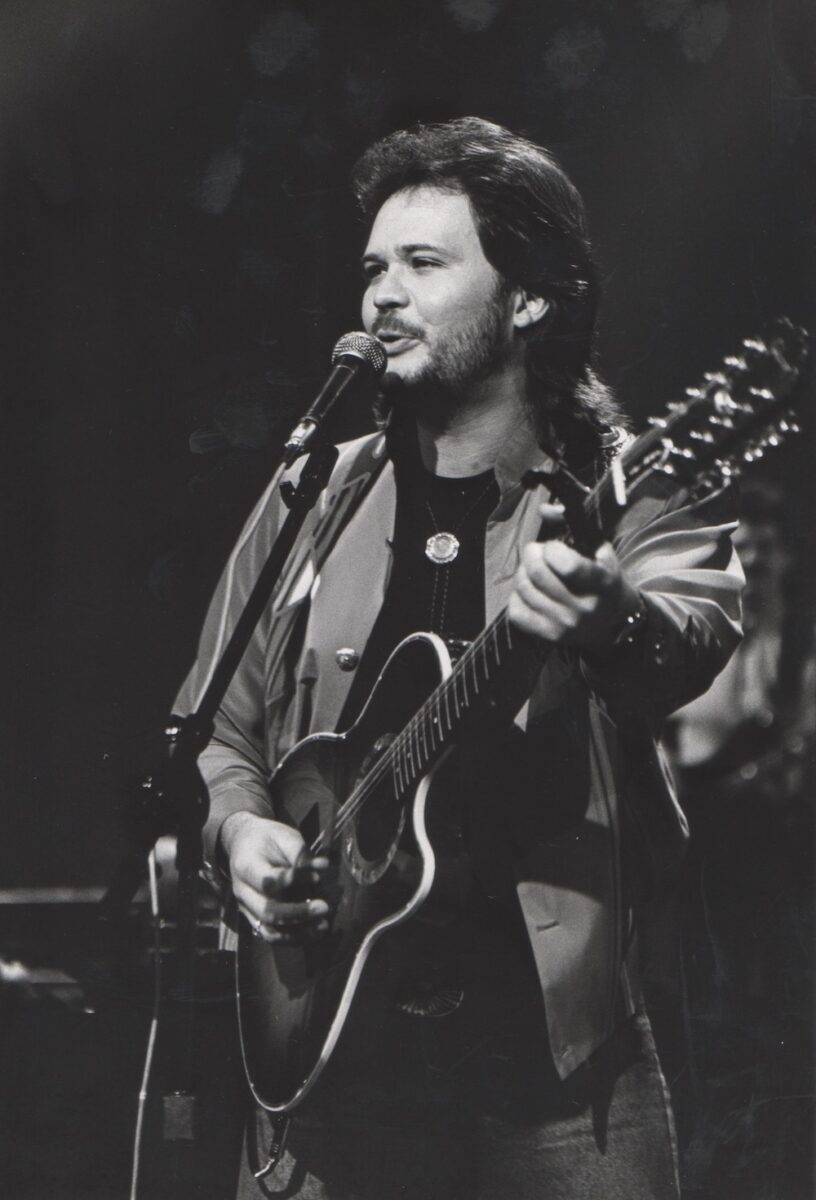
So I did both jobs for a while and it nearly killed me, but I was young and I could handle it, you know. And after a while, I realized that I was having more fun at my night job than I was at my day job. And I also realized, oddly enough, that I was making more money at my night job than I was at my day job. So I wrestled around with the idea of just pursuing it full time for several months. And finally I went to my father, my boss, who was the vice president of the company. And I said, “Listen, I’m really struggling with the idea.” I said, “I’ve got an opportunity to pursue this career in music. But I’m afraid because I’ve only got bookings at this one place and after those bookings run out, I don’t know where the next bookings [are] coming from. And I obviously don’t know where the next paycheck is coming from.” And he was an old guitar player that was really good. As a matter of fact, at one point, he’d been offered an opportunity to go out on the road with Carlos Santana and he turned it down because it was a family business. And he told me how much he regretted that decision and that he said, “Look, I encourage you to do it.” He said, “Go do it, chase your dream.” He said, “Because I’m going to be an old man one day and I’ll be sitting in my rocking chair on the front porch wondering whether or not I could have made it in this business.” He said, “You go pursue that dream.” And he said, “If it doesn’t work out, your job here is safe.” So that was all I needed. That was the kick out of the nest that I needed. And I started going out and playing shows and I never looked back.
I’ve been blessed in so many ways. I mean, I’ve had the opportunity to work with just about every single one of my heroes that I ever had, not just get to meet them and talk with them, but get to actually work with them and play concerts with them, record with them. I had the opportunity to work with Ray Charles, who was probably the most influential person on what comes out of my mouth when I sing than anybody on the planet. I had the opportunity to work with the Eagles back at a time when they had been on a fourteen year hiatus. And I did an album called Common Thread, which was a tribute to the Eagles and all the country music artists of the day participated in that. I’ve worked with so many great people over the years, and it’s just been more than I ever imagined when I first got started, I mean, you certainly dream about it, but I’m one of those people that can look back and say, honestly, my dreams have more than come true.
“I’m one of those people that can look back and say, honestly, my dreams have more than come true.” – Travis Tritt
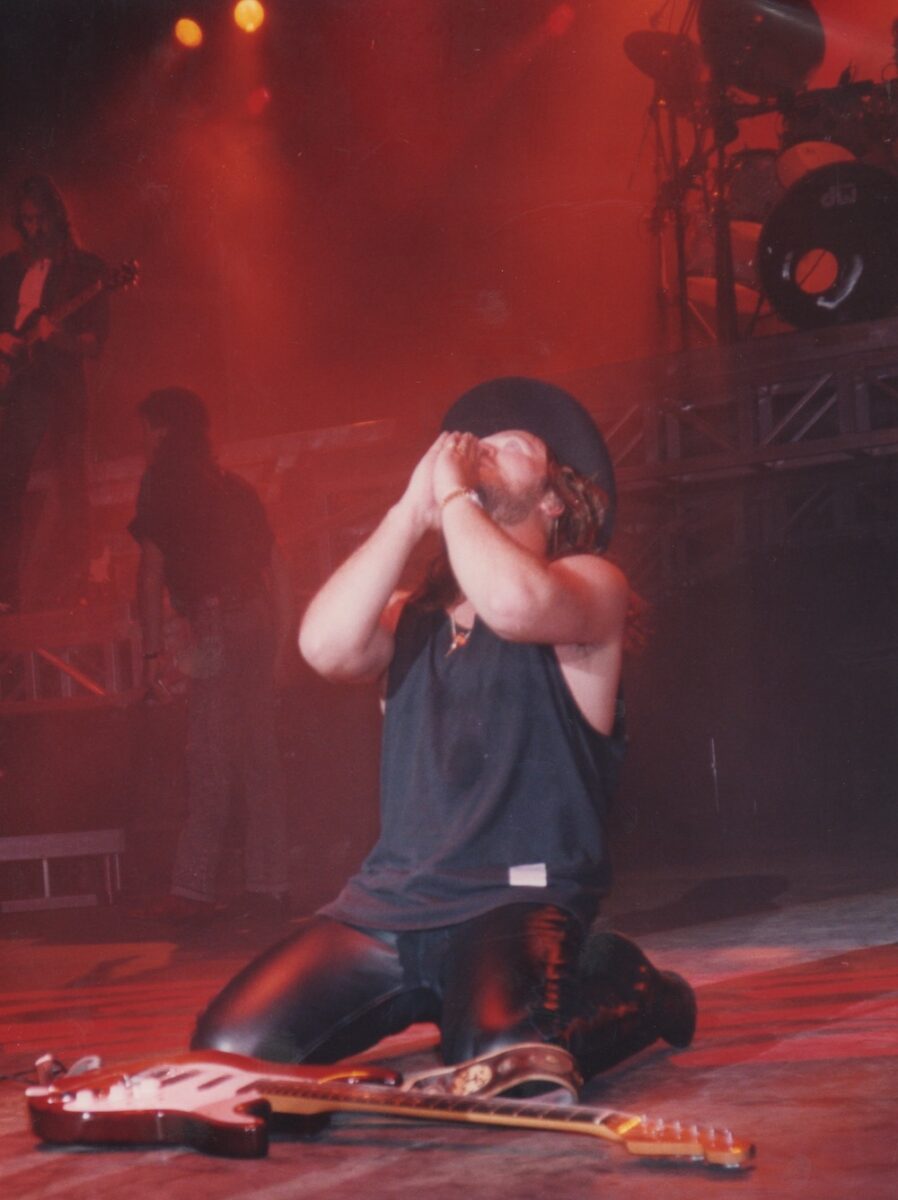
I am a big believer in counting your blessings. So my prayers start off each night with thanking God for all the blessings. And like the old song says, you know, count your blessings and name them one by one. I do that every single night when I pray. I thank God, first of all, for my health. I thank Him for my family. I thank Him for the protection that He’s provided for me over the years, keeping us out of harm’s way. I thank Him for salvation. I thank Him for the talent that He blessed me with. I don’t know why on earth He chose me, but I’m so thankful for it. And not only the talent that He blessed me with, but also the ability to be able to use that talent to go out and entertain people, to make people smile and forget their troubles for a little while, or lift people up or take them on a journey in their mind or their spirit and be able to not only do that, but to be able to use that to make an extremely good living for me and my family members. All of those are blessings. And they came from one place and that’s God. I know those things happen from heaven without a shadow of a doubt. So I thank God for those things every single night.
Narrator: Lastly, we’ll hear from Reba McEntire, and her sisters Susie and Alice.
Reba, Susie, & Alice’s Story
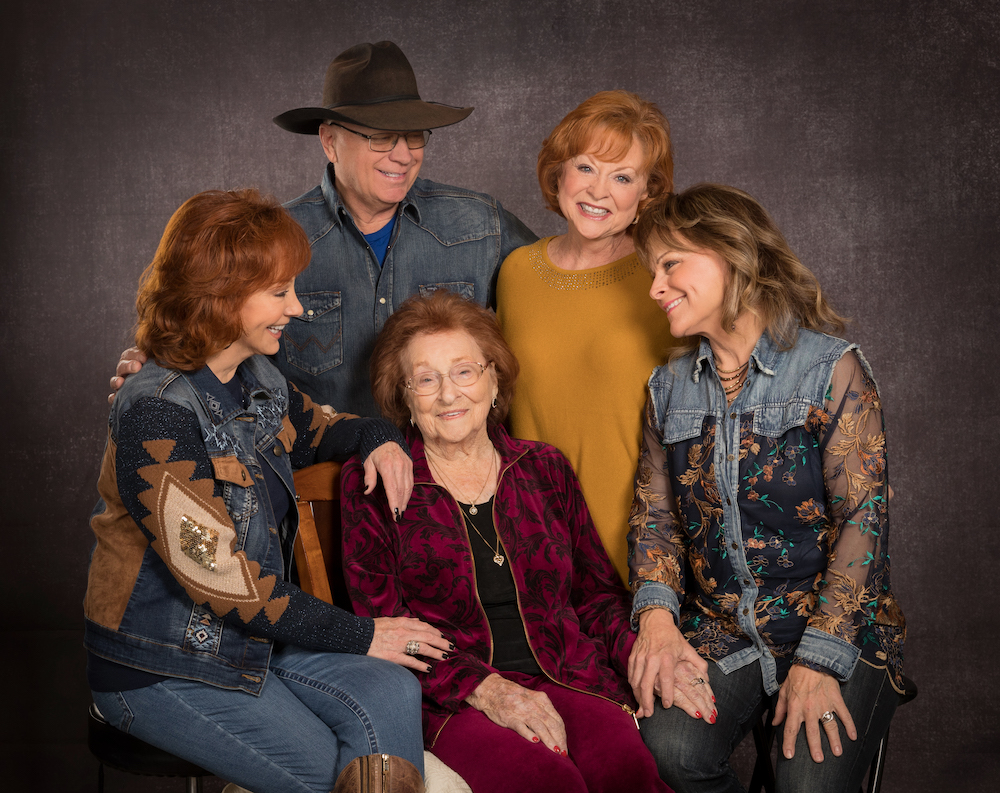
Alice: I want to talk about Daddy’s faith. Daddy being a rodeo cowboy was rough. He was a rancher. Ranchers didn’t back then, ordinarily didn’t go to church. They didn’t talk about their spirituality or anything like that. But I really think Daddy was convicted, he knew by just nature, he’d heard enough about Jesus, that he knew what he should do. He got saved and baptized, what, in ‘80? Some time in ‘80. and he was not ashamed at all to go down in front of the church and be baptized. And I think that took a load off of his conscience.
Susie: That’s true. I remember one time he said, “Well, you get insurance for your house, you ought to get insurance for your soul.”
Reba: I’d never heard that. That’s a good one.
Susie: He was very logical, he wasn’t real “ooey wooey” but if it needed to be done, well, why not do it? Why wouldn’t you do this? And I think that’s a really good way to to think about it. I mean, Jesus provided that for us. Why don’t we accept it as a free gift? So he was very logical in that.
Alice: Y’all remember when we would go to Chockie to the church and Pastor Edge was preaching and Daddy would be intent. He was just listening so carefully and he’d say “Preacher, preacher…”
Susie: Right during his sermon.
Alice: Daddy had a question and he figured if he didn’t ask it right then that they might not get the answer.
Reba: Well, he might forget it.
Alice: And he would stop the sermon and say, “Yes, Clark, what do you need?” And he said, “I don’t quite understand.”
Reba: Speaking of baptism. We got to tell about Mama’s baptism, which was late in life. She was 87, or 88. But it was a fun day, we weren’t there, but Tricia Ann, our cousin was, and said that…
Alice: …when she went down to the front of the church…
Reba: Yeah, when she was at church and they were doing altar call and Mama went down and Joey Landsdale, the preacher, said, “Well, Jackie, what can I do for you?” She said, “Well, preacher, I’m turning myself in.” And then we came in when she got baptized. That was wonderful.
Susie: Alice, I remember when I was having trouble in my first marriage, you were working for the Department of Human Services and you afforded me a way to get out. I didn’t take it, but you were always taking care of us. For some reason I could go to you before I could go to my mama in many instances. And I just want to tell you thanks. Thanks for trying. And Reba, you gave me lots of opportunities on the road. I mean, I went with you when you first started. I was with you on your first bus. I went with you on those radio tours and I got to sing with you on the Opry and so many good things. Sisters are good for lots of things, and I really feel sorry for women who don’t have a sister, but God will always provide a very good friend to be with each other. And it’s a sisterhood. It’s something that’s blood. And it goes farther than blood. You can almost communicate with each other across the miles and you know what’s going on. You know, somebody needs to be called. So I just wanted to say that, how much both of you have influenced my life for the better.
Reba: Right back at you.
Susie: I remember Grandma saying—and I have relied on this. She told me, she said, “Always tell the Lord thank you. Thank you.” And when I don’t have anything else to pray about, I just stop and I say, “Thank you, God, thank you. I don’t know what’s coming next. I don’t know how I’m going to do this, but I just want to say thank you.” And that has resonated—simple little thing that she said probably to every one of us, but it continues to resonate in our lives. There’s that ripple effect that you’re going to make, you’re going to make, I’m going to make in our kids and our grandkids.
“When I don’t have anything else to pray about, I just stop and I say, ‘Thank you, God, thank you. I don’t know what’s coming next. I don’t know how I’m going to do this, but I just want to say thank you.’” – Susie McEntire-Eaton
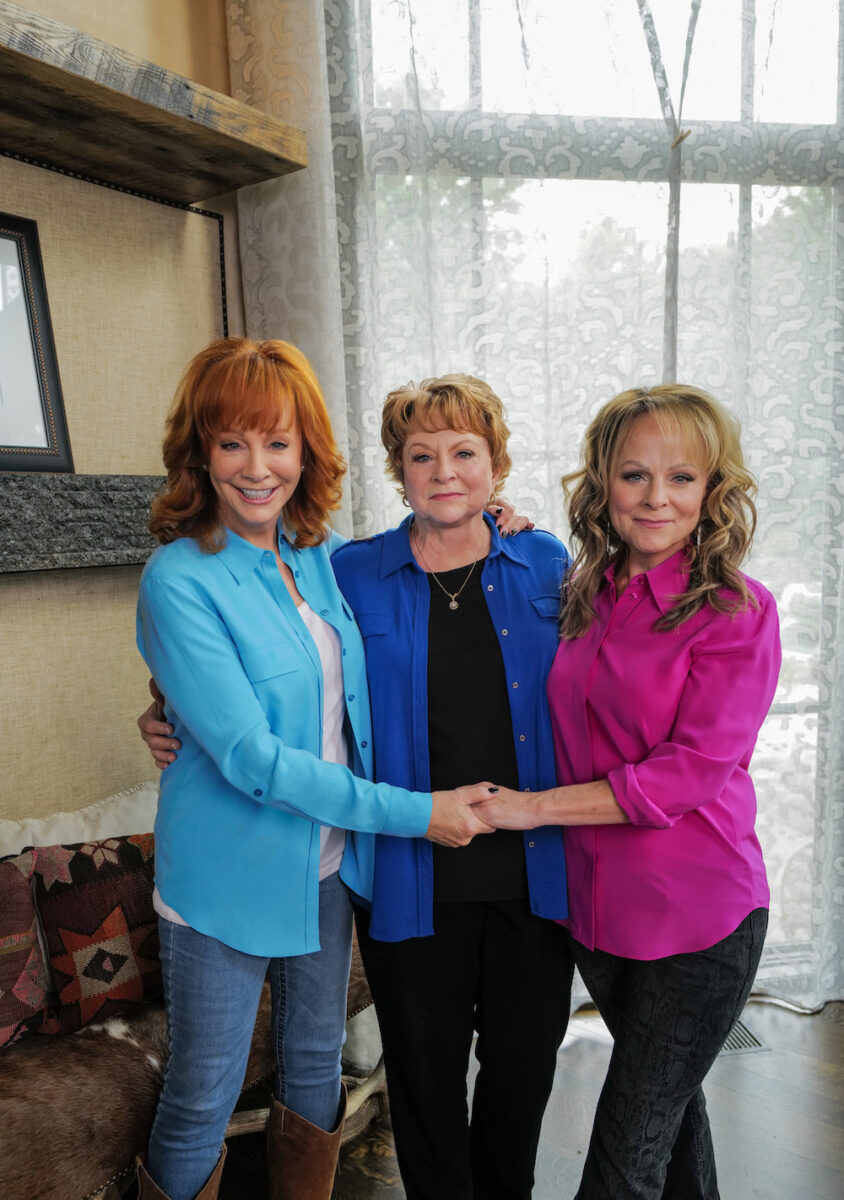
Reba: I think I read that in Jesus Calling the other day, that when you pray, when you give thanks, it’s the thing that goes straight up to heaven and they hear it the loudest—the thankfulness. But the main thing that I’ve learned over these last couple of years is love. With the prejudices, with the madness over politics, and what’s going on and who’s getting more attention, who’s not getting attention, if we would just all love one another and accept the faults, love them for who they are, give them grace because they might have had a real rough day when they came in and chewed you out for something. Just back off and think, Maybe they had a rough day.I’m having a good day. Everybody should be happy like me. No, that’s not the way it works. That’s true. Cut them a little slack and just love them no matter what color or what their belief.
Susie: That’s right. So Reba, would you read from Jesus Listens, November 27th, if you would?
Reba:
Bountiful Jesus,
I give thanks to You, for You are good; Your Love endures forever.
I want to take time to think about the many blessings You provide. Thank You, Lord, for the gift of life—for every breath You give me. I’m grateful also for everyday provisions: food and water, shelter, clothing, family and friends. But the greatest gift I’ve received from You, my Savior, is everlasting Life!
As I consider all that You have done for me, I delight in who You are—the great I Am! You are one hundred percent good. There is not even a speck of darkness in You,
Susie: Not a speck.
Reba:
the Light of the world! Moreover, Your Love is unending; it goes on and on throughout eternity.
Because I belong to You, I am never separated from Your loving Presence. I know that You are always near, so I don’t need to worry about whether or not I sense Your Presence. Instead of focusing on my feelings, help me to simply trust that You are with me—and to thank You for Your unfailing Love.
In Your blessed Name,
Amen
Narrator: To listen to the full interviews with any of these country music artists, please visit www.JesusCalling.com/podcast.
If you’d like to hear more stories from country musicians whose lives have been impacted by a relationship with God, check out our interviews with Larry Fleet, Lauren Alaina, Randy and Mary Travis, Aaron Tippin, Gary LeVox, and more.
Next week: Philip Yancey
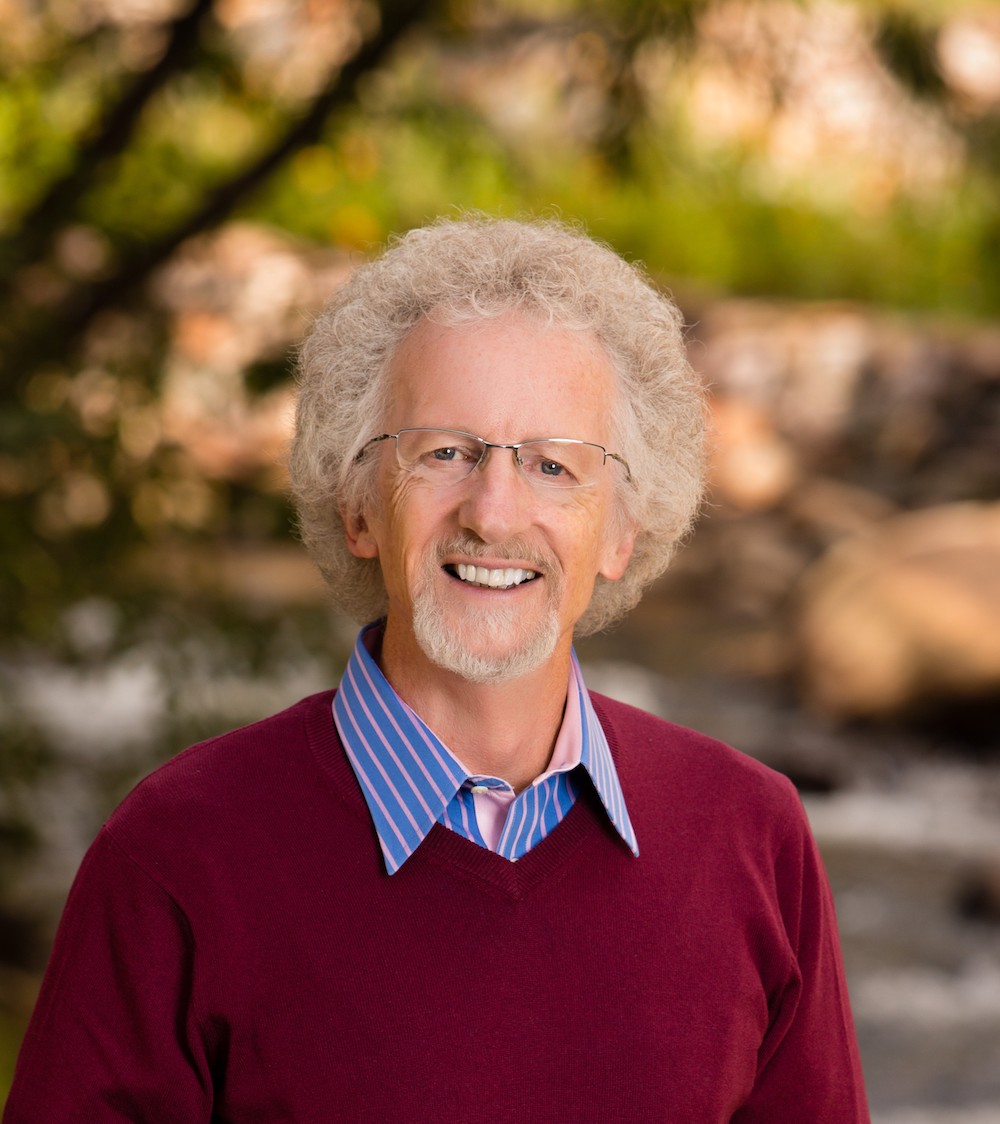
Next time on the Jesus Calling Podcast, we’ll hear from best-selling Christian author Philip Yancey, who underwent a profound journey to revisit the concept of God he was taught as a child, and re-learned about a different God, a God of creativity, beauty, and love.
Philip Yancey: One of my quests, I suppose, as an author, is to find out what’s genuine and what’s fake. When you grow up in a church environment, it’s easy to learn how to behave, how to give a testimony, how to pray, how to do the things that look spiritual. And then one day you wake up and wonder, Is this just a learned behavior pattern that I have, or is it genuine? Am I really connecting to the God of the universe?
